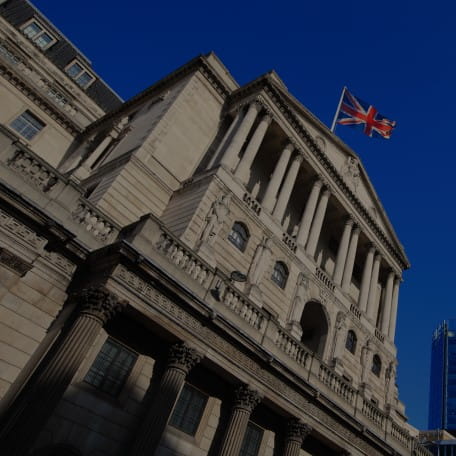- Stockmarkets have largely bounced back from the banking ‘mini-crisis’
- Bank lending standards have tightened, which may affect central bank interest rate decisions
- Consensus is pointing to a peak in rates, particularly in the US
The Bank of England today followed in the footsteps of the ECB and Fed by once again hiking interest rates, in an ongoing bid to control rampant inflation. But with lending conditions getting steadily tougher, might the latest round of central bank hikes be the last?
As Donald Phillips of the Global Fixed Income team noted in March, “Ultimately, the banking system relies on confidence; without it, all banks would be vulnerable to a deposit run at some point.”
Over the last couple of months, central bank interest rate hikes have pushed up short-term yields in bond markets and led bank depositors to question the low rates they are being offered, an effect we briefly covered in a snapshot last month.
Subsequent deposit flight triggered solvency problems for a handful of banks who were over-reliant on short-term deposit funding and were forced to liquidate bond portfolios at losses.
A spate of banking failures began with Silicon Valley Bank in March and most recently claimed the scalp of First Republic last week. The worry now is that speculators may well move on to another target, and Global Fixed Income fund manager Phil Milburn warns “given banking is a confidence game, there is a risk that these speculative attacks become self-fulfilling”.
Facing this prospect, it’s unsurprising that banks are becoming more cautious in their lending decisions with a view to getting loan books and balance sheets looking lean and healthy.
In last month’s snapshot, Why are investors flocking to bonds, we suggested “if banks respond to balance sheet concerns by tightening lending standards, the overall supply of credit in the economy may contract”.
Handily, there are lots of surveys and metrics which track banks’ lending, and the early evidence is that this effect is already kicking in. To take an example, Bloomberg compiles 12 elements from the European Central Bank’s Bank Lending Survey to create one simple measure. Currently, this is showing that lending conditions have tightened to levels not seen since during the global financial crisis of 2008/9.
The point here is that this trend will have a big impact on the wider economy, even if it seems as if this year’s crisis has already been shrugged off outside of the banking sector.
If less credit is being released into the economy, this has the same contractionary effect on activity as would an interest rate rise or other policy tool from a central bank.
Therefore, following rate increases this week and last from the Bank of England, US Federal Reserve, and the European Central Bank (ECB), might we now, finally, have reached the ‘peak’ interest rate that so many equity investors have yearned for?
Well, the answer is a probably a qualified ‘yes’ in the US. In contrast, more increases should be expected in Europe where the ECB started its rate hiking cycle much later and currently stands 2% below US levels. In the UK, one more increase is priced in for the June meeting, at which point we may have reached a peak at 4.75%.
Looking at these in turn, the widely expected US decision to raise rates by 25 basis points to a 5.0% - 5.25% range prompted market commentators to debate whether this is a pivot or, as Fed chair Jerome Powell was keen to paint it, a pause.
Milburn describes it as a conditional pause: “Unless there is significant strengthening in economic data between now and the 14 June meeting, I would expect rates to stay on hold. With the economy slowly losing momentum I think there is a very high hurdle for data to beat in order for the Fed to hike again.”
Judging by what financial markets are pricing in via interest rate futures, the consensus is very much around a pivot. No more hikes are expected, but four cuts to around 4.0% are priced in by the end of January 2024. This compares with two months ago when the expected January 2024 policy rate was 5.2%.
Turning to Europe, this is how Milburn sees the next few months playing out having listened to ECB president Christine Lagarde explain the decision to raise rates 25bps to 3.25%: “There is now a strong central case that the ECB will raise rates by two more 25bps increments to reach a terminal rate of 3.75%; similarly to the Fed, it would take a big shift in economic data to deter them from this path.”
In the UK, the Bank of England has had to contend with inflation running at higher levels than elsewhere – partly the result of trade frictions introduced since Brexit. But Milburn thinks the bank has also made several policy errors.
“The Bank of England cut rates too far and printed too much money during lockdowns, using mainly demand-based measures to tackle a supply problem. It was then far too cautious raising rates; if it had acted sooner or faster then the peak would not have needed to be as high.
“While headline inflation should start to improve as last year’s energy price spike feeds into the comparable period, core inflation will remain stickier and makes another hike likely. But I think the Bank of England has overshot, with monetary policy already tight enough to cause a significant slowdown later this year. Having disliked the gilt market for years until Truss/Kwarteng spiked bond yields higher, we have now increased our UK duration exposure to reflect the valuation opportunity from government and central bank policy mistakes.”
KEY RISKS
Past performance is not a guide to future performance. The value of an investment and the income generated from it can fall as well as rise and is not guaranteed. You may get back less than you originally invested.
The issue of units/shares in Liontrust Funds may be subject to an initial charge, which will have an impact on the realisable value of the investment, particularly in the short term. Investments should always be considered as long term.
Investment in Funds managed by the Global Fixed Income team involves foreign currencies and may be subject to fluctuations in value due to movements in exchange rates. The value of fixed income securities will fall if the issuer is unable to repay its debt or has its credit rating reduced. Generally, the higher the perceived credit risk of the issuer, the higher the rate of interest. Bond markets may be subject to reduced liquidity. The Funds may invest in emerging markets/soft currencies which may have the effect of increasing volatility. Some of the Funds may invest in derivatives. The use of derivatives may create leverage or gearing. A relatively small movement in the value of a derivative's underlying investment may have a larger impact, positive or negative, on the value of a fund than if the underlying investment was held instead.
DISCLAIMER
This is a marketing communication. Before making an investment, you should read the relevant Prospectus and the Key Investor Information Document (KIID), which provide full product details including investment charges and risks. These documents can be obtained, free of charge, from www.liontrust.co.uk or direct from Liontrust. Always research your own investments. If you are not a professional investor please consult a regulated financial adviser regarding the suitability of such an investment for you and your personal circumstances.
This should not be construed as advice for investment in any product or security mentioned, an offer to buy or sell units/shares of Funds mentioned, or a solicitation to purchase securities in any company or investment product. Examples of stocks are provided for general information only to demonstrate our investment philosophy. The investment being promoted is for units in a fund, not directly in the underlying assets. It contains information and analysis that is believed to be accurate at the time of publication, but is subject to change without notice. Whilst care has been taken in compiling the content of this document, no representation or warranty, express or implied, is made by Liontrust as to its accuracy or completeness, including for external sources (which may have been used) which have not been verified. It should not be copied, forwarded, reproduced, divulged or otherwise distributed in any form whether by way of fax, email, oral or otherwise, in whole or in part without the express and prior written consent of Liontrust.










